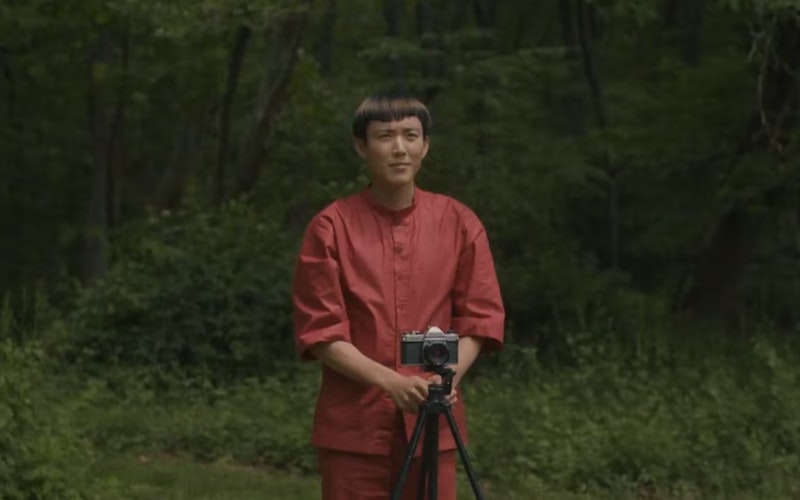
Movies
Tasting and Seeing in After Yang
If you want to see the beauty of the world, just make a cup of tea.
As preposterous as it sounds, After Yang, the second feature from director and video essayist Kogonada, dared me to find the profound in my morning cup of earl grey (or, for bolder days, lapsang souchong). Throughout the film, which is in select theaters and streaming on Showtime, there’s a recurring shot of various loose-leaf teas steeping. The camera never lingers on these images for too long, but in their deliberate framing, minor details stand out: steam rises from the top like incense and the stiff leaves vibrantly blossom and swirl like a colony of tadpoles.
Images like this—hints of deep beauty and complex worlds being found in the most mundane—accent one of the film’s central themes. Like Kogonada’s first film, Columbus, After Yang is meditative, dreamy, and leisurely in its pacing, yet this film's purposeful slowness—no, stillness—is an invitation to practice wonder and beholding. The same way you might let your tea steep to allow flavors to become more richly opened, so too does the film’s pace point to how the act of wonder is really the first step to love.
After Yang focuses on parents Jake (Colin Farrell) and Kyra (Jodie Turner-Smith) and their adopted Chinese daughter Mika (Malea Emma Tjandrawidjaja). Neither Jake nor Kyra are Chinese, but they want Mika to connect with her cultural roots. And so they purchase the titular “Techno sapien” (Justin H. Min) to serve as Mika’s caretaker and cultural educator. One day, Yang malfunctions while the family participates in a virtual dance competition (the choreography, set to composer Aska Matsumiya’s “Welcome to Family of 4,” makes this the best opening-credits sequence to grace screens this year). Jake attempts to fix Yang before the android decomposes; in the process, he discovers Yang’s memory bank.
Yang’s memories are divided by the lives he has lived, with each life getting its own “cluster.” Each cluster looks like the Milky Way, a galaxy of light. As Jake watches Yang’s memories, each “galaxy” expands out to reveal thousands, if not millions, of memories that Jake can explore, recalling the film’s image of a cup of steeping leaves. In this vast cosmos of affection, Jake encounters moments that Yang captured and found significant: a mirror selfie, a cup of tea, a scene of a woman (Hayley Lu Richardson) at a concert, among others. As Jake watches Yang’s memories, he realizes that these recollections are a chance for him to not necessarily remember what has happened, but to appreciate what he may have overlooked.
The film's purposeful slowness is an invitation to practice wonder and beholding.
One such memory revisits the film’s opening scene, in which the family poses for a photo. In it, Jake irritably beckons to Yang, who is setting up the camera, to come and join them. Yang can be heard, off-screen, telling Jake to wait “one second.” When Jake watches this memory again, we learn that Yang’s call to wait was really his desire to savor the moment. Whereas that memory for Jake was tinged with frustration, for Yang it was swaddled in tenderness. There was a beauty in seeing the family together that Yang wanted to savor, whereas Jake was ready to move on from the moment far too quickly.
In his essay collection Tremendous Trifles, author and theologian G.K. Chesterton writes, “I will sit still and let the marvels and the adventures settle on me like flies. There are plenty of them, I assure you. The world will never starve for want of wonders; but only for want of wonder." Examples of this abound in the Bible. “When I consider your heavens, the work of your fingers, the moon and the stars, which you have set in place, what is mankind that you are mindful of them, human beings that you care for them?” the psalmist declares. In Matthew, Jesus asks, “And why do you worry about clothes? See how the flowers of the field grow. They do not labor or spin. Yet I tell you that not even Solomon in all his splendor was dressed like one of these.” The answer to our worries—wondering what we will eat or drink—is given in the fabric of creation. In looking at the lilies, we see how God loves and pays attention to the smallest details. So how much more must he love his image-bearers? We can embrace our smallness (or creatureliness), for in doing so, we can fall that much more in love with God’s transcendence and magnificence.
As for Yang, he believed that a cup of tea “could contain the world.” (Slight spoilers ahead.) His wonder allowed him to love richly. Jake too, by the film’s end, having beheld Yang’s memories, grows in greater affection for the Techno sapien, seeing Yang not just as a machine, but as a true brother and part of the family. In the same way, can we dare bring ourselves to wonder at God’s creation? Can we believe that there is beauty to be found in life—particularly in the small and overlooked—and in doing so, “taste and see” that he is good?
Topics: Movies